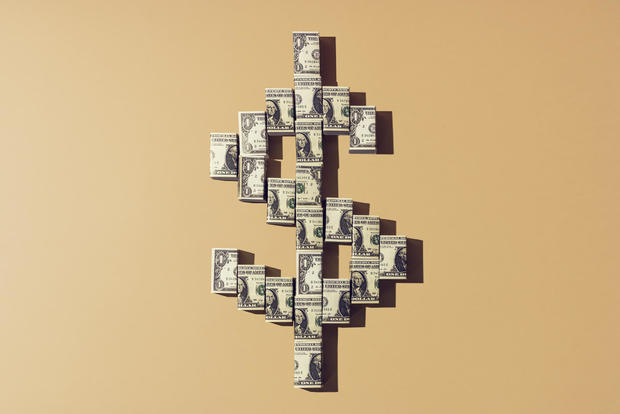Is now the right time to open a jumbo CD?
The pandemic had a range of economic impacts, like supply chain disruptions, a real estate frenzy and strong consumer spending in some sectors, combined with significant government stimulus money being added to the economy. Much of that helped fuel a booming economy, but one that arguably got too hot as inflation ramped up. And, since 2022, the Federal Reserve has been working to try and cool inflation, ratcheting up interest rates and recently increasing its benchmark rate to the highest level in 22 years.
The Fed doesn't directly control all interest rates, but by making it more expensive for banks to borrow, the costs are then passed down to borrowers. In turn, there tends to be higher interest rates for things like credit cards and mortgages. While that can be hard for borrowers, the flip side is that savers and investors can benefit from earning higher interest rates on their savings.
Some certificates of deposit (CDs), for example, pay above 5% annual interest, thereby giving individuals a relatively safe way to outpace current inflation levels. But not all CDs are the same. In addition to different banks and credit unions offering different interest rates, CDs can vary based on the duration and the amount of the deposit. Jumbo CDs, which typically require a minimum deposit of $100,000, can also pay higher interest rates than regular CDs. Not all financial institutions offer jumbo CDs, and the difference in rates can be relatively small, but if you have enough money to deposit to obtain the higher yield, it could be worth it in some situations.
Explore the rates you could get with a top savings account now.
Is this the right time to invest in a jumbo CD?
Now could be a good time to invest in a jumbo CD if you're looking to maximize your returns without taking on too much risk or complexity. That's not to say it's the best option for everyone with $100,000 to spare, but in this high-interest-rate environment, jumbo CDs could be attractive to some savers/investors.
"Investing in a jumbo CD is a good idea for people with shorter-term goals that will take three months to a year and will need at least $100,000," says Michelle Wagner, CFP and senior director of membership at Facet.
For example, if you know you'll need money soon for a large housing expense and want to earn a little extra on that cash, a jumbo CD could make sense.
"Some people may use jumbo CDs towards a down payment for a house or a home renovation with a specific time frame in mind," she says. Jumbo CDs are "great when you have clarity on your savings goals and when you'll need to fund the expense."
Another reason to invest in a jumbo CD could be if you have "an upcoming tuition payment," says Ryan M. Vogel, CFP, chief planning officer and partner at Novi Wealth.
There might not be much time to grow your savings for the upcoming back-to-school season, but putting money into, say, a 3-month jumbo CD for the spring semester could help you earn a little extra by the time you have to make that payment.
Jumbo CDs could also be a good "if you are recently retired and know you will need cash in the near future for living expenses," says Vogel.
In addition to their returns, jumbo CDs can be attractive to some savers by having FDIC insurance or comparable protection at credit unions. That "can provide great peace of mind," says Wagner.
Note, however, that the $250,000 FDIC insurance limit is per depositor. So, if you have $100,000 in a jumbo CD and $200,000 in a savings account at the same bank as a sole owner, then $50,000 of that would be uninsured. Thus, if you're approaching FDIC limits at one bank, you might want to open new accounts elsewhere to increase your coverage.
Learn more about the top rates you could qualify for on your savings.
Alternatives to jumbo CDs
While there are several situations where jumbo CDs can make sense, not everyone wants to lock up so much money. Closing a CD before it matures typically comes with penalties that cut into your returns, even if the principal is protected.
"If you need the flexibility to withdraw funds relatively soon, a high-yield savings account lets you sidestep the risk of early withdrawal penalties," says Wagner.
A money market account can also provide better flexibility, notes Vogel.
Other investments can provide higher returns too, especially if you have a longer time horizon.
"Although jumbo CDs can have terms up to five years, there are typically better options for goals beyond a year," says Wagner. She points to investments like bond funds and Treasuries that could make sense for those with short-to-medium term goals, while "holding at least some equities usually makes sense" for those with a five-year or longer time horizon.
And if you're not sure what your goals look like to this level of detail, then a diversified portfolio might be a better fit.
"If your time horizon for investments is indefinite, then taking on more risk via a diversified portfolio of stocks and bonds, to receive a higher rate of return, might be a better option," says Vogel.
Also, consider taxes. Depending on your tax bracket, you might find that some investments provide better net returns than others, even if the headline returns aren't the same.
"CDs produce taxable income. If you are in a high tax bracket, then municipal bonds would be a better alternative," adds Vogel. Municipal bonds are generally not federally taxable, though they could incur state or local taxes in some situations.
The bottom line
Overall, investing in a jumbo CD can be a good way for some savers and investors to get higher returns than they could with some other cash-like products, especially for those with short-term goals. But figuring out whether a jumbo CD is right for you requires figuring out what your goals are and how much risk you're willing to take.
"I find most people are either way too conservative or way too aggressive with the investment risks they take. CDs are easy to purchase and understand, so many people just stick with them when they could earn much more with a properly diversified portfolio of stocks and bonds," notes Vogel.
Analyzing your upcoming cash needs and the returns of different financial instruments can help, as can speaking with a trusted financial professional. And before you lock up money in a jumbo CD, don't forget the basics, like having a fully funded emergency fund, adds Vogel.




